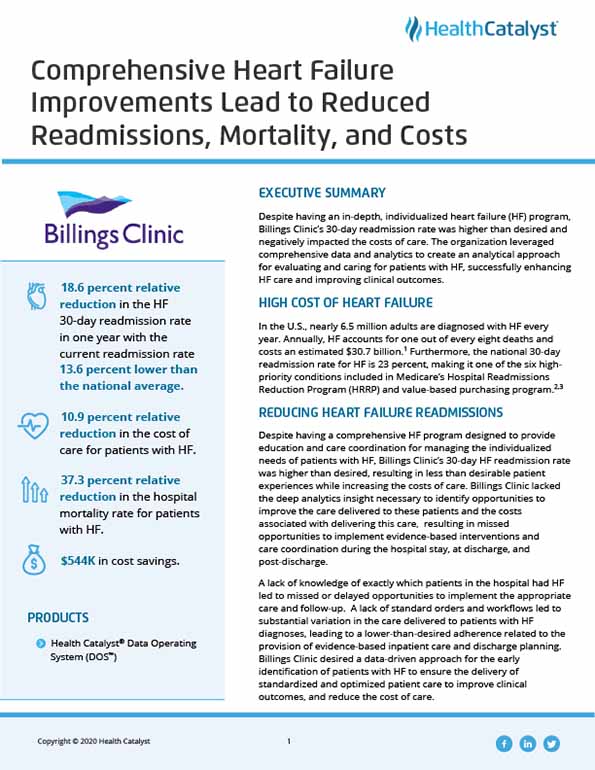Despite having an in-depth, individualized heart failure (HF) program, Billings Clinic’s 30-day readmission rate was higher than desired and negatively impacted the costs of care. The organization leveraged comprehensive data and analytics to create an analytical approach for evaluating and caring for patients with HF, successfully enhancing HF care and improving clinical outcomes.
In the U.S., nearly 6.5 million adults are diagnosed with HF every year. Annually, HF accounts for one out of every eight deaths and costs an estimated $30.7 billion.1 Furthermore, the national 30-day readmission rate for HF is 23 percent, making it one of the six high-priority conditions included in Medicare’s Hospital Readmissions Reduction Program (HRRP) and value-based purchasing program.2,3
Despite having a comprehensive HF program designed to provide education and care coordination for managing the individualized needs of patients with HF, Billings Clinic’s 30-day HF readmission rate was higher than desired, resulting in less than desirable patient experiences while increasing the costs of care. Billings Clinic lacked the deep analytics insight necessary to identify opportunities to improve the care delivered to these patients and the costs associated with delivering this care, resulting in missed opportunities to implement evidence-based interventions and care coordination during the hospital stay, at discharge, and post-discharge.
A lack of knowledge of exactly which patients in the hospital had HF led to missed or delayed opportunities to implement the appropriate care and follow-up. A lack of standard orders and workflows led to substantial variation in the care delivered to patients with HF diagnoses, leading to a lower-than-desired adherence related to the provision of evidence-based inpatient care and discharge planning. Billings Clinic desired a data-driven approach for the early identification of patients with HF to ensure the delivery of standardized and optimized patient care to improve clinical outcomes and reduce the cost of care.
Billings Clinic’s HF program convened an outcomes improvement team, led by a physician specializing in HF, charged with improving care across the continuum to improve outcomes for patients with HF and reduce 30-day readmission rates. To enhance the skills of the improvement team, members attended the Health Catalyst® Accelerated Practices (AP) Program, an immersive and project-based experiential course that incorporates real-world application of the tools and knowledge required to achieve significant outcomes improvement.
Billings Clinic understood that success begins with leveraging data from multiple systems to identify improvement opportunities—and then implementing and monitoring targeted interventions to improve performance. It leveraged the Health Catalyst® Data Operating System (DOS™) platform and a robust suite of analytics applications, including the Heart Failure Analytics Accelerator, to access data and analytics more easily. Using the analytics accelerator, the organization can quickly visualize outcome and process metrics in an easy-to-consume, one-page summary, which includes patient cohorts, definitions, and process measures that are clinically relevant, standard, and meaningful across domains—eliminating time-intensive development of cohorts of patients with HF or definitions of HF severity.
The analytics accelerator includes process measures, such as documentation of ejection fraction and adherence with evidence-based guidelines and care transitions, and outcome measures including mortality, readmission rate, length of stay, and cost per case.
The improvement team uses the analytics accelerator to support a disciplined, data-driven approach to the evaluation and care of patients with HF, helping to drive and sustain significant improvement in clinical and financial outcomes. For the first time, Billings Clinic can efficiently identify inpatients with HF, allowing the provision of evidence-based care to these patients—and enabling comprehensive analyses of performance.
The improvement team utilized the analytics accelerator to identify and address gaps in compliance with evidence-based guidelines. The data demonstrated two distinct areas in need of additional focus, including:
Using this information, the improvement team engaged providers across practices to develop standard workflows to guide clinical decisions to improve inpatient care, and standard workflows to improve transitions of care and outpatient care activities.
Registered nurses with HF expertise receive a list of admitted patients with HF, allowing purposeful rounding, enhanced case management, improved patient education, and a refined method of ensuring patients receive care that is consistent with the most recent evidence-based guidelines.
Billings Clinic developed and implemented a discharge checklist embedded within the EMR to facilitate evidence-based activities during the discharge process. The discharge checklist pulls information such as ejection fraction, lab results, and medications into one location so clinicians can easily determine if the evidence-based recommendations are being correctly followed. Each patient receives a follow-up phone call within 48 hours of discharge and is scheduled for a follow-up appointment with an HF specialist or, in some cases, a primary care provider, within seven days of discharge from the hospital.
Providers across all clinics received education on HRRP measure requirements, the most recent evidence-based guidelines, new standard workflows, and how to use the analytics accelerator, enabling providers to self-monitor patient outcomes.
The improvement team meets bi-monthly to refine workflows and share performance data obtained from the analytics accelerator regarding compliance. Providers receive personalized feedback describing their compliance with the discharge form and the diuretic protocol.
Billings Clinic successfully improved HF care, which has resulted in improved clinical outcomes and substantial cost savings, including:
Billings Clinic’s data-driven, standard improvement efforts have enabled the organization to participate in risk-shared savings programs. The organization also received national recognition for its improvement efforts and was a recipient of the American Heart Association’s Get With the Guidelines Silver Plus Award.
"We are no longer simply reacting to problems. The Heart Failure Analytics Accelerator has enabled us to be a data-driven organization."
- Sherrie Fuller-Benge, BSN, Director of Quality Resources, Billings Clinic
Billings Clinic plans to implement an inpatient diuresis protocol and is developing specific, targeted improvement efforts that support patients discharged with HF for up to 90 days to avoid emergency department visits, prevent HF readmissions, and reduce the cost of care.




